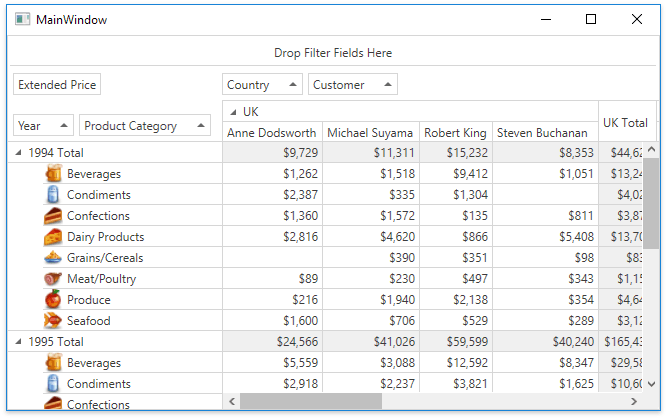PivotGridControl.FieldValueTemplate Property
Gets or sets a template used to display field values. This is a dependency property.
Namespace: DevExpress.Xpf.PivotGrid
Assembly: DevExpress.Xpf.PivotGrid.v25.2.dll
NuGet Package: DevExpress.Wpf.PivotGrid
Declaration
Property Value
| Type | Description |
|---|---|
| DataTemplate | A DataTemplate object representing the template used to display field values. |
Remarks
The FieldValueTemplate is applied to those fields whose PivotGridField.ValueTemplate property is set to null. The PivotGridField.ActualValueTemplate property allows you to obtain which template is currently used for a particular field.
You can implement custom logic to choose the required template using the PivotGridControl.FieldValueTemplateSelector property (or the PivotGridField.ValueTemplateSelector property to do this for individual fields).
Example
This example defines a custom template used to display field values. The template in this example displays field values with images, as shown in the picture below.

Tip
A complete sample project is available in the DevExpress Code Examples database at https://supportcenter.devexpress.com/ticket/details/e2191/pivot-grid-for-wpf-how-to-create-a-field-value-template.
A custom control CategoriesControl displays the field’s text along with the related image. The required information is retrieved from the DataContext which is converted to the FieldValueElementData type.
A template for a certain field is assigned to the PivotGridField.ValueTemplate property . Also, you can use PivotGridControl.FieldValueTemplate property to apply a custom template to all field values.
using DevExpress.Xpf.PivotGrid;
using HowToCreateFieldValueTemplate.CategoryPicturesTableAdapters;
using System;
using System.Collections.Generic;
using System.IO;
using System.Windows;
using System.Windows.Controls;
using System.Windows.Media;
using System.Windows.Media.Imaging;
namespace HowToCreateFieldValueTemplate
{
public class CategoriesControl : Control, IWeakEventListener {
#region static staff
static CategoriesTableAdapter categoriesTableAdapter;
static Dictionary<string, ImageSource> categoriesPictures;
public static readonly DependencyProperty ImageSourceProperty;
static CategoriesControl() {
DefaultStyleKeyProperty.OverrideMetadata(typeof(CategoriesControl),
new FrameworkPropertyMetadata(typeof(CategoriesControl)));
Type ownerType = typeof(CategoriesControl);
ImageSourceProperty = DependencyProperty.Register("ImageSource", typeof(ImageSource),
ownerType, new UIPropertyMetadata());
categoriesPictures = new Dictionary<string, ImageSource>();
}
static CategoriesTableAdapter CategoriesTableAdapter {
get {
if(categoriesTableAdapter == null)
categoriesTableAdapter = new CategoriesTableAdapter();
return categoriesTableAdapter;
}
}
static ImageSource GetImage(string categoryName) {
if(string.IsNullOrEmpty(categoryName)) return null;
if(categoriesPictures.ContainsKey(categoryName)) {
return categoriesPictures[categoryName];
} else {
byte[] icon = CategoriesTableAdapter.GetIconImageByName(categoryName) as byte[];
if(icon == null || icon.Length == 0) {
return null;
}
BitmapDecoder img = new PngBitmapDecoder(new MemoryStream(icon),
BitmapCreateOptions.None,
BitmapCacheOption.OnLoad);
ImageSource imageSource = img.Frames[0];
if(imageSource.Height < 1) return null;
categoriesPictures.Add(categoryName, imageSource);
return imageSource;
}
}
#endregion
public CategoriesControl()
: base() {
FrameworkElementDataContextChangedEventManager.AddListener(this, this);
Unloaded += OnUnloaded;
}
public ImageSource ImageSource {
get { return (ImageSource)GetValue(ImageSourceProperty); }
set { SetValue(ImageSourceProperty, value); }
}
void OnUnloaded(object sender, RoutedEventArgs e) {
ImageSource = null;
}
void OnDataContextChanged() {
SetImageSource();
}
void SetImageSource() {
FieldValueElementData item = this.DataContext as FieldValueElementData;
if(item != null && !item.IsOthersRow && !string.IsNullOrEmpty(item.DisplayText)) {
ImageSource = CategoriesControl.GetImage(item.Value as string);
} else {
ImageSource = null;
}
}
#region IWeakEventListener Members
bool IWeakEventListener.ReceiveWeakEvent(Type managerType, object sender, EventArgs e) {
return OnReceiveWeakEvent(managerType, e);
}
protected virtual bool OnReceiveWeakEvent(Type managerType, EventArgs e) {
if(managerType == typeof(FrameworkElementDataContextChangedEventManager)) {
OnDataContextChanged();
return true;
}
return false;
}
#endregion
#region FrameworkElementDataContextChangedEventManager
public class FrameworkElementDataContextChangedEventManager : WeakEventManager {
static FrameworkElementDataContextChangedEventManager CurrentManager {
get {
Type managerType = typeof(FrameworkElementDataContextChangedEventManager);
FrameworkElementDataContextChangedEventManager currentManager =
(FrameworkElementDataContextChangedEventManager)WeakEventManager
.GetCurrentManager(managerType);
if(currentManager == null) {
currentManager = new FrameworkElementDataContextChangedEventManager();
WeakEventManager.SetCurrentManager(managerType, currentManager);
}
return currentManager;
}
}
FrameworkElementDataContextChangedEventManager() { }
public static void AddListener(FrameworkElement source, IWeakEventListener listener) {
CurrentManager.ProtectedAddListener(source, listener);
}
public static void RemoveListener(FrameworkElement source, IWeakEventListener listener) {
CurrentManager.ProtectedRemoveListener(source, listener);
}
protected override void StartListening(object source) {
FrameworkElement FrameworkElement = (FrameworkElement)source;
FrameworkElement.DataContextChanged += OnDataContextChanged;
}
protected override void StopListening(object source) {
FrameworkElement FrameworkElement = (FrameworkElement)source;
FrameworkElement.DataContextChanged -= OnDataContextChanged;
}
void OnDataContextChanged(object sender, DependencyPropertyChangedEventArgs e) {
base.DeliverEvent(sender, null);
}
}
#endregion
}
}